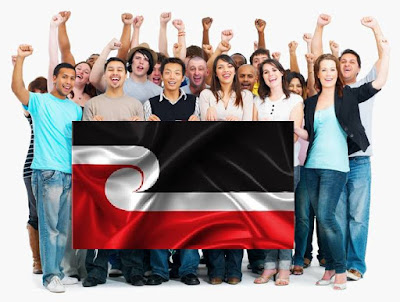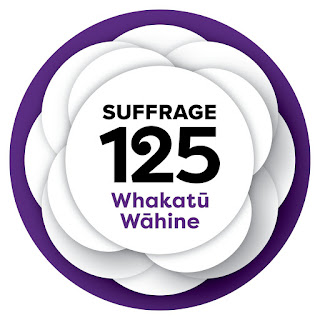Some words on Decolonise Your Minds! Hui
Decolonise Your Minds! Hui, 4-5 Feb 2012, at the kindly-gifted-at-no-cost, Ponsonby Community Centre, in Tamaki Makaurau, Aotearoa, saw just under 40 fierce, fantastic and fabulous women, genderqueer and trans folk, bubbling and raging under its rafters.
Two days of speakers, workshops and conversations covered the multiplicity of identities and communities we inhabit and partake within, and all the delightful complexities and painful tensions that come with it.
The first presentation was a showcase of Elizabeth Kerekere's art, much of it commissioned and placed in the Gisbourne court. This was a strategic positioning acknowledging that there are many Maori who don't go to art galleries, so expanding the venues where more Maori can access her art. She also recognises the courts and the prison system being a structurally violent place for Maori, and using her pieces to challenge, heal and uplift. Through her art, Elizabeth spoke to various aspects of her identity and politics sharing personal stories of her involvement in various movements and experiences of structural oppression throughout her life. It was a moving, insightful and inspiring presentation. Elizabeth's talk brought us to the multiplicities in ourselves and communities, and the healing of those wounds and disjunctures. Belinda Borell showed us through the smokescreened invisibility of whiteness and white culture, as an operating norm that plays out in indigenous and coloured tau iwi negative statistics. A wee booklet called "Understanding Pakeha Culture" compiled by the Dept of Labour in the 60's was a hilarious hit, much of it blatantly applying today. There was also a strategic suggestion that due to pakeha culture and the value it places on professionalism, social justice for indigenous peoples and learning more about NZ history, racism and structural inequity, needs to work the angle that it would be beneficial to their careers. Belinda also illustrated how the common symbols regarded as “kiwiana” or parts of “New Zealand culture” are mainly symbols of British and European culture, aspects of Maori culture are incorporated when it is convenient for Pakeha. Zac and MZ presented some of the intersections between speciesism and decolonisation. Exploring the use of animals in the process of colonisation in Aotearoa, and the status of animals as property under western capitalism, they challenged the structural violence against non-human animals in colonial settler states. They showed that animal agriculture was a crucial aspect of making colonisation possible by providing an economic base for settlers. Justifications for colonialism often reduced indigenous people to animal status to dehumanise and dominate. The dairy industry was used to illustrate the connections between colonialism, speciesism, sexism, neo-imperialism in the context of Aotearoa. Images of animalisation of people of colour were used to illustrate the symbiotic relationship between speciesism and racism. It challenged us to examine our relationships to non-human animals from our own cultural perspectives. Decolonise the Mic, the Saturday evening, saw a diverse range of performances from poetry to punk rock, from kapa haka to acoustic folk. Thanks to all the performers who made the night so powerful, fun, inspiring and beautiful! Nga mihi nui ki a koutou. Cheers to Nga Tangata Hou, Texta, Whaitiri Mikaere, Marama Davidson, Kamea, Ellie, Giang, Takiaya and Pandie and Melting Pot Massacre!
A cruisy 12noon start time kicked off our second day.
Farida Sultana gave us a stirring/inspiring challenge to not censor or tone down our feminism in our communities, or else nothing changes and shifts. She talked about some of her struggles as an Asian migrant in Aotearoa and interactions with Maori women. She used personal anecdotes to illustrate that feminism is not just in the universities or western countries, many of her aunts in rural areas in Bangladesh practiced feminism and challenged patriarchy in their own ways without calling themselves feminists. Ruth DeSouza took us into the world of cultural safety, or cultural un-safety as more than a few workshop examples showed the damage that dominant culture acts and assumptions cause and maintain. She demonstrated the pakeha-centric discourses around maternity in her field of nursing and the way oppression impacts on the bodies of migrant mothers. A deep cutting, awkward and brightly honest exercise initiated by a number of indigenous hui participants, mapped out so clearly the costs and consequences of colonisation. An exercise showing, that while we all shared experiences of marginalisation and racism, the privileges available and accessible to coloured tau iwi within a colonial context, starkly contrasted to the colonial impacts on indigenous peoples, regarding class, poverty, domestic violence, substance abuse, education, incarceration and going hungry. It was a powerful display of some of the class differences amongst us and an exercise that brought up a lot of emotions and tensions.
The hui closed heartfelt and strongly, with challenges to reach, foster and create bridges with many groups of people not represented at the hui, as well as suggestions for a Reo component, noho styles on a marae, and for the hui to be longer.
Decolonise Your Minds! Hui 2012 would like to give the massive props, and deeply thank Rainbow Youth, Ponsonby Community Centre, The Quakers Local Peace Grant, A-Fem Hui and individual donors and supporters and helpers, for the myriad of your generous support.
Check out some audio of the presentations, kindly hosted by PrideNZ.com
A cruisy 12noon start time kicked off our second day.
The hui closed heartfelt and strongly, with challenges to reach, foster and create bridges with many groups of people not represented at the hui, as well as suggestions for a Reo component, noho styles on a marae, and for the hui to be longer.
Check out some audio of the presentations, kindly hosted by PrideNZ.com
A special thank you to the organisers and participants for allowing parts of the hui to be recorded and made available online.


I Liked it
ReplyDelete